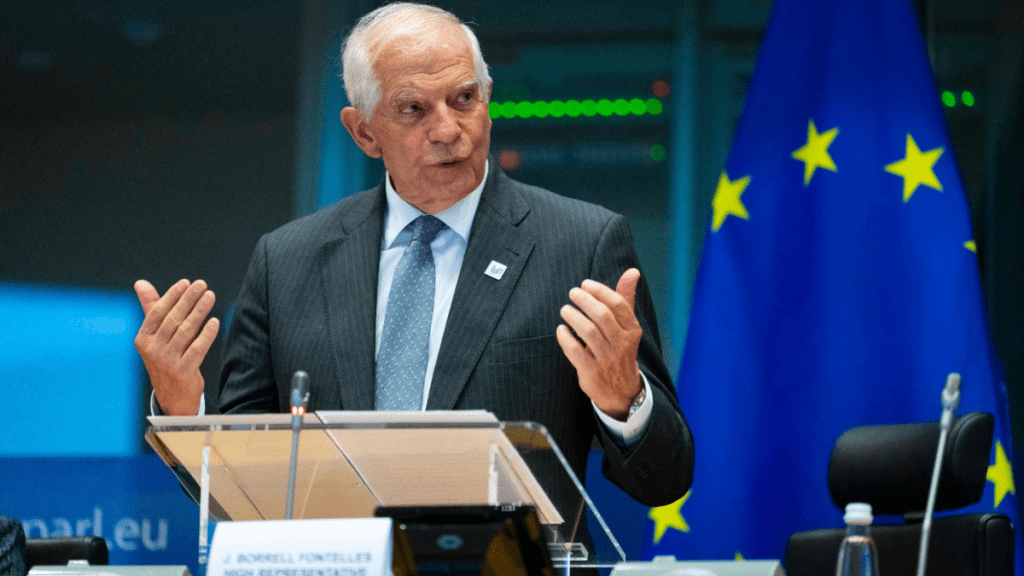The seas and space will be the new battlefields of the future, says European Union’s High Representative/Vice-President Josep Borrell.
At the Schuman Forum for Security and Defence, he addressed Ministers from the European Union and over 50 partner countries and stated freedom of navigation is a major global public good, essential for global trade and security.
Borrell emphasised that securing maritime routes and ensuring safe passage for ships are critical, as disruptions can have catastrophic consequences worldwide. Space, too, is becoming a strategic domain, with increasing reliance on satellite technology for various civilian and military purposes. The EU is focused on addressing these emerging threats through enhanced cooperation and strategic initiatives.
Common Threats
He highlighted the resurgence of power politics and the strategic use of interdependence as a weapon. Dependencies that were once seen as mutual benefits have now become vulnerabilities exploited by stronger states. This shift is evident in the return of high-intensity wars, not only in Ukraine and Gaza but also across Africa and Latin America. These conflicts, although often underreported, cause significant casualties and instability.
Hybrid threats have emerged as a modern challenge, involving information manipulation, the weaponization of migration, and cyberattacks. Such threats do not involve traditional warfare but can create severe disruptions with minimal physical violence. The war in Ukraine represents an existential threat to Europe, while the conflict in Gaza poses significant ethical dilemmas. Borrell emphasized that a Russian victory in Ukraine would embolden aggressors worldwide, undermining international law and threatening global stability.
The international rules-based order is being tested severely in the Middle East, where the response to Hamas’ terrorist attack against Israel has led to unprecedented violence. Borrell underscored that while the conflicts in Ukraine and Gaza dominate headlines, numerous other conflicts, including those in Sudan and the Horn of Africa, continue to inflict widespread suffering.
Global security has become a “single security theatre,” with regional hotspots like the Bosphorus, the Red Sea, and Taiwan holding significant global implications. These areas are critical for food, energy, and technology supplies, and any instability there can have far-reaching consequences. The interconnectedness of global threats is evident in the actions of countries like North Korea and Iran supporting Russia, and the strategic importance of regions like the Indo-Pacific for chip production and critical materials.
Adapting European Security and Defence
The escalating threats have prompted the European Union to rethink its approach to security and defence. Historically, the EU was not a military alliance but focused on promoting peace among European nations. This success led to the belief that peace was the norm, forgetting that conflict is more common in global history.
Recognising the need for a robust security and defence capability, the EU has adopted the Strategic Compass, setting new ambitions in this field. This includes creating a Rapid Deployment Capacity of 5,000 soldiers, operational by next year, and increasing defence spending to close gaps in defence capabilities. The EU aims to reduce duplications and enhance the interoperability of its 27 national armies, striving for a more unified defence strategy.
Boosting the European defence industry is another priority, not only to support Ukraine but also to replenish European stocks and reduce dependencies. Public support for these measures is high, with 80% of Europeans favouring more EU cooperation on defence, indicating a strong mandate for these initiatives.
The challenge, however, lies in the political will of member states. Defence remains a national competence, and the creation of a common defence policy touches deeply on national sovereignty. Despite these challenges, Borrell stressed the importance of working together to build a collective defence framework, essential for responding to modern threats.
Enhancing Partnerships
Borrell emphasised the importance of partnerships in addressing security challenges. Cooperation through missions on land and sea, capacity building via the European Peace Facility (EPF), and deepening security dialogues are key strategies. The EPF, although separate from the EU budget, allows member states to provide military support to partners, playing a crucial role in supporting Ukraine and other countries.
The EU has launched nine new missions and operations, including military assistance to Ukraine and missions in Mozambique, often in collaboration with other partners. The European Peace Facility has extended support to 22 countries, underscoring the EU’s commitment to global security.
Africa is a significant focus, with the EU providing nearly €1 billion in military support through the EPF to the African Union and African countries. The EU is developing more flexible and accurate solutions to address instability, exemplified by the new Security and Defence Initiative in the Gulf of Guinea, aimed at curbing terrorism spilling over from the Sahel.
Ensuring Freedom of Navigation
Freedom of navigation is a major global public good, critical for global trade and security. The EU deploys missions like EUNAVFOR Atalanta in the Horn of Africa and the Coordinated Maritime Presence in the Gulf of Guinea to ensure safe passage for ships. The recent European Union-United States joint naval exercise highlights the importance of international cooperation in securing maritime routes.
Addressing Hybrid Warfare and Emerging Threats
The EU is also focused on countering hybrid warfare, as seen in Moldova, which faces cyberattacks rather than conventional military threats. Supporting partners in developing geospatial intelligence through the European Union Satellite Centre is part of the strategy to counter these new threats.
Expanding security and defence partnerships is crucial, with new agreements signed with Moldova and Norway and more in the pipeline. Borrell invited interested countries to build security partnerships with the EU, aiming to create a global network to enhance collective security.
In conclusion, Borrell highlighted the importance of dialogue and cooperation, noting that the EU engages in over 80 security dialogues worldwide. By building bridges, understanding diverse priorities, and finding common ground, the EU aims to reverse negative trends and contribute to global security and peace.


